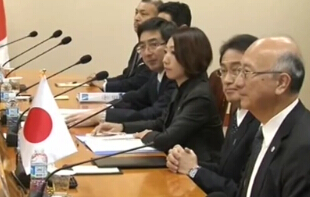Japanese officials announced Monday the country has apologized to, and agreed to compensate, South Korean women who were forced to work as sex slaves during World War II.
周一日本官員宣布,日本已經(jīng)道歉并愿意賠償二次世界大戰(zhàn)期間被迫充當(dāng)性奴隸的韓國婦女。
Tens of thousands of so-called "comfort women" were put into Japanese military brothels, including many South Koreans, while Japan occupied the country from 1910 to 1945.
數(shù)以萬計的所謂“慰安婦”被迫進(jìn)入日本軍妓,包括許多韓國人,其在1910年到1945年間被日本占領(lǐng)。
The BBC reports only 46 South Korean "comfort women" are still alive. Japan has agreed to pay the $8.3 million South Korean officials requested to aid the now elderly women.
據(jù)英國廣播公司報道,目前僅有46名韓國“慰安婦”還活著。日本已同意支付韓國官員要求的830萬美元幫助這先老年婦女。

In return, South Korea will remove a statue symbolizing "comfort women" in front of the Japanese embassy in Seoul.
作為回報,韓國將拆除一座日本駐首爾大使館前象征著“慰安婦”的雕像。
The deal is arguably a significant shift for Japan's prime minister, whose administration last year hinted at revoking a 1993 apology by a Japanese official.
該協(xié)議無疑是日本首相的重大轉(zhuǎn)變,其政府去年暗示撤銷1993年日本官員的道歉。
American officials had urged the countries to reconcile in the past, partly to balance power in the face of a growing China.
過去美國官員敦促各國和解,部分是為了平衡中國日益增長的力量。
Many hope the deal will help end decades of hostile feelings between the two nations.
許多人希望這項協(xié)議能有助于結(jié)束數(shù)十年來兩國之間的敵對情緒。
However, some of the former "comfort women" are ignoring the apology because the payment, under the terms of the deal, isn't necessarily a direct reparation.
然而一些前“慰安婦”卻無視道歉,因為根據(jù)此協(xié)議條款不一定是直接的賠償。
譯文屬可可原創(chuàng),僅供學(xué)習(xí)交流使用,未經(jīng)許可請勿轉(zhuǎn)載。











